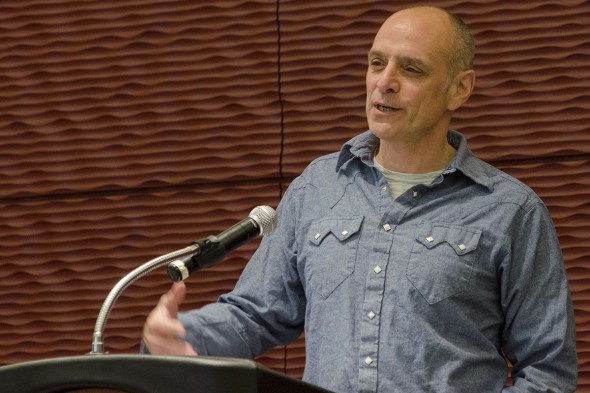Injustice on the menu for food workers

“The food we eat too often has been made possible by someone else’s misery,” Eric Schlosser, author of “Fast Food Nation,” tells a campus audience. Photo: Joshua Clark/UIC Photo Services
Sure, Eric Schlosser is in favor of organic lettuce, farmers markets, school gardens and free-range cattle.
“But discussions about sustainability usually don’t mention what really needs to be sustained in this country: human beings,” he said, referring to the workers who harvest, package, prepare and serve our food.
“The food we eat too often has been made possible by someone else’s misery,” the investigative journalist said.
“And that someone else usually hasn’t been white.”
Schlosser, who spoke to a full house in Student Center East Thursday afternoon, was the keynote speaker for the Conference on Food Justice, sponsored by the Institute for the Humanities and the Chancellor’s Initiative in the Humanities.
With his best-selling book Fast Food Nation, Schlosser said he followed the example set by Upton Sinclair about 100 years ago with The Jungle, which exposed the dangerous practices of the meatpacking industry in Chicago.
With Fast Food Nation, “I wrote about food as a way of looking at America, as a prism to see what has happened to this country in my lifetime,” Schlosser said.
“Our food has changed more in the previous 30 years than in the last 30,000 without most of us realizing it, mostly because of McDonald’s and the fast food industry.”
The U.S. food system is now “under the control of just a handful of corporations,” he said, adding that this “rise of unchecked power is a threat to workers, consumers and our democracy.”
Most fruit and vegetables are harvested by hand, Schlosser said, by workers here without documentation, vulnerable to exploitation and afraid to protest working conditions “more appropriate to the 1890s than the 1990s.” They work without contracts, not knowing how long the workday will be or how much they will be paid, he said, adding that sexual harassment and sexual assault is common.
“Almost 20 years after I first started visiting the fields in California, the conditions are worse. The wages are even lower,” he said.
In the meatpacking industry, The Jungle eventually led to reforms and the rise of organized labor, which gave meatpacking workers good wages and benefits, Schlosser said.
But the rise of the fast food industry, with its demands for mass production and low cost, “transformed working conditions — broke the unions, cut wages and eliminated benefits,” Schlosser said.
Most meatpacking workers are now from other countries, at least one-fourth of them here without documentation, and the work is among the most dangerous in the U.S., he added.
“You are connected to every one of these workers every time you eat fresh fruit and fresh vegetables,” he said. “Anyone who eats meat in this country is connected to these workers with every single bite.”
Schlosser also discussed the conditions for workers in the food service industry, “another group treated with enormous disrespect.”
“The fast food industry pioneered a new service sector job with low wages, no benefits, no training and all the knowledge built into the machinery,” he said.

Schlosser signs a copy of “Fast Food Nation” after his lecture.
Photo: Joshua Clark/UIC Photo Services
“You don’t need workers who are trained for skills — they can be treated as if they are interchangeable and disposable objects.”
The average restaurant worker, Schlosser said, earns about $18,000 a year, with no benefits or paid sick days.
“These are the wages of the people who are feeding you and serving you in this city,” he said.
The $8.25 minimum wage in Illinois ($1 per hour higher than other states) is less than in 1955 when adjusted for inflation, Schlosser said.
“I’ve been called a socialist, a communist, for my views on this subject. When people ask, I say I’m an Eisenhower Republican — I’d like to have the minimum wage what it was when he was president.”
Schlosser disagreed with criticism that an increase in the minimum wage would harm business.
“When you give more money to working people in this country, there will be more money spent on things that put other people to work,” he said.
Schlosser urged his audience to work for food justice by advocating for economic justice.
“A food system based on poverty and exploitation will never be sustainable,” he said.
“What we need is awareness and compassion and the willingness to organize and help and vote — and make sure we are connected to justice, and not injustice, with every bite.”
